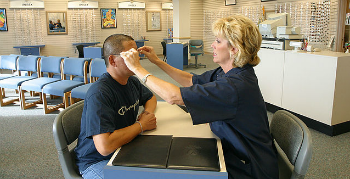Employers and Universities: Work with us?

How to become an optician
Are you a great communicator, with an interest in using your scientific know-how to help people? A career in eye-care could be the perfect fit for you.
In this guide we’ll explore the career paths of the two main eye-care professionals, optician and optometrist. We’ll answer:
- What’s an optician and what do they do?
- How much do opticians earn?
- What skills would I need to become an optician?
- How to become an optician.
- What is an optometrist what do they do?
- How much do optometrists earn?
- Is becoming an optometrist right for me?
- How to become an optometrist.
What’s an optician and what do they do?

These days when people use the word “optician”, they usually mean a range of different eye-care specialists (the main ones are optometrists, dispensing opticians and ophthalmologists (eye surgeons)). Here though, we’ll be looking specifically at the role of “dispensing opticians”.
These are the pros who give advice on your eyesight. They provide customers with glasses and contact lenses that suit their particular needs.
The tasks of an optician include:
- Interpret prescriptions that have been written by optometrists.
- Calculate how far and at what angles people can see.
- Give advice and info on what contact lenses a customer might be able to get.
- Take frame and face measurements for glasses or lenses to make sure they fit perfectly.
- Sell different types of glasses frames.
- Fit contact lenses and show customers how to use and look after them.
- Advise patients who might have partial eye-sight on how to use vision aids.
- Communicate with sales representatives from different glasses and lenses suppliers.
How much do opticians earn?
Dispensing opticians earn between £26,000 and £40,000, according to the National Careers Service. Some opticians also work in hospitals, or as teachers. They can also train to become an optometrist.
What skills would I need to become an optician?
Is this career right for you? Answer the following questions about your transferable skills and personal qualities to see if it’s a good fit:
- Brilliant communication skills: do you enjoy working with customers? Are you good at giving clear advice?
- An aptitude for maths and science: are you good with numbers?
- Accurate approach for frame fitting and keeping records: do you have good attention to detail?
- Able to handle different instruments and equipment: how’s your hand-eye coordination?
- Excellent interpersonal skills: are you confident, caring and genuinely like working with people?
- Sales skills: do you have powers of persuasion?
How to become an optician
You need to complete a course that is approved by the General Optical Council. You can read about the different courses and routes here. You will also need to take the professional qualifying exams of the Association of British Dispensing Opticians (ABDO).
You can also gain experience in optical retail by doing an apprenticeship as an optical retail assistant. You’ll develop key skills, technical abilities and a professional qualification while working on the job. Find apprenticeships using the government’s search tool.
A work placement will give you valuable skills and experience when it comes to applying for jobs or apprenticeships. Contact your local opticians’ to find out about work experience opportunities.
What is an optometrist and what do they do?
An optometrist is a highly trained eye-care specialist who test eyesight, and recognise and treat eye conditions. They write prescriptions for glasses, lenses, vision therapy or medication.
The everyday responsibilities of an optometrist include:
- Examining patients, looking at the internal and external structure of eyes, in order to detect any abnormalities or diseases.
- Testing patients’ ability to focus and see depth and colours, sometimes using an eye chart.
- Giving advice on how to treat any eye conditions or diseases.
- Using different instruments and equipment to measure and test eyesight.
- Prescribe glasses or contact lenses.
- Refer clients to specialists or ophthalmologists (eye surgeons).
How much do optometrists earn?
According to the National Careers Service, optometrists typically earn between £37,000 and £61,000. These figures will vary depending on whether you work in the NHS or for a private company.
Is becoming an optometrist right for me?
Is this the right path for you? Well, that depends on your personal qualities and what you want out your career. Optometry is one of those jobs that make a difference in people’s lives. Optometrists use their expert skills and training to help people see better, but they can also make patients aware of potentially life-threatening illnesses or defects like diabetes, high blood pressure or even a brain tumour.
You’ll need to have a knack for maths and science, as well as organisational skills. Great people skills and teamworking skills are important. You should also know how to work on your own initiative, and come up with solutions to problems.
Check out this video to see what studying optometry is like:
How to become an optometrist
In order to become an optometrist, you’ll need a degree in optometry and 1 year’s paid, supervised work experience with a registered optometrist. You’ll then need to register with the General Optical Council (GOC)
Does optometry sound up your street? Check out our guide to the skills you need to work in healthcare.
Related posts
How to find volunteering opportunities that will help with your career
